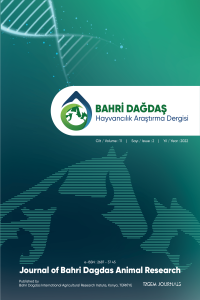Consumer Attitudes Towards Animal Welfare and Its Relation to Demographic and Socio-Economic Factors
Abstract
In developing sustainable production and consumption models based on animal welfare, there is a need to determine the commercialization capacity of animal welfare-friendly products. This study was carried out to examine the cognitive, affective, and behavioural sub-dimensions of the West Aegean region consumers' attitudes towards animal welfare and determine the effects of the demographic and socio-economic profile of the consumers on their animal welfare attitudes. The Animal Welfare Attitude scale was applied to 415 consumers in İzmir and Aydın. Consumers' attitudes towards animal welfare were positive, most associated with the cognitive and affective dimensions. However, it was comprehended that the knowledge and awareness of the consumers about the animal food production chain were insufficient. Some demographic and socio-economic factors significantly affected respondents' attitudes toward animal welfare and their willingness to pay more for animal welfare-friendly products. Gender, education level, monthly income, and companion animal ownership significantly affected consumers' attitudes toward animal welfare. It has been determined that as the attitude toward animal welfare rises, consumers' willingness to purchase animal welfare-friendly food products also increases. It was concluded that the consumers of the West Aegean Region have a positive attitude and motivation to support the development of national sustainable production and consumption models based on animal welfare.
References
- 1. Apostol L, Rebega OL, Miclea M. Psychological and socio-demographic predictors of attitudes toward animals. Procedia-Social and Behavioral Sciences. 2013;78: 521-525. doi:10.1016/j.sbspro.2013.04.343.
- 2. Beardsworth A, Bryman A, Keil T, Goode J,Haslam C, Lancashire E. Women, men and food: the significance of gender for nutritional attitudes and choices. British Food Journal.2002;104(7):470–491. http://dx.doi.org/10.1108/00070700210418767.
- 3. Bir C, Davis M, Widmar N, Zuelly S, Erasmus M. Perception of animal welfare with a special focus on turkeys.Frontiers in Veterinary Science. 2019; 413. https://doi.org/10.3389/fvets.2019.00413.
- 4. Bozkurt Z. Avrupa Birliği’nde Etçi ve Yumurtacı Tavukların Refah Standartları için Yasal Gereklilikler ve Türkiye’nin Uyumu. Bahri Dağdaş Hayvancılık Araştırma Dergisi,2017; 6(2): 23-35.
- 5. Bryła P. Organic food consumption in Poland: Motives and barriers. Appetite, 2016; 105: 737–746. doi:10.1016/j.appet.2016.07.012.
- 6. Cassidy ML, Warren BO. Famıly Employment Status And Gender Role Attıtudes: A Comparison of Women and Men College Graduates. Gender & Society. 1996;10(3): 312–329. doi:10.1177/089124396010003007.
- 7. Clark B, Stewart GB, Panzone LA, Kyriazakis L, Frewer LJ. (2016). A Systematic Review of Public Attitudes, Perceptions and Behaviours Towards Production Diseases Associated with Farm Animal Welfare. Journal of Agricultural and Environmental Ethics.2016; 29(3):455–478. doi:10.1007/s10806-016-9615-x.
Hayvan Refahına Yönelik Tüketici Tutumu ve Hayvan Refahı Tutumunun Demografik ve Sosyo-Ekonomik Faktörlerle İlişkisi
Abstract
Hayvan refahına dayalı sürdürülebilir üretim ve tüketim modellerinin geliştirilmesi için refah-dostu gıda ürünlerinin ticarileştirilme kapasitesinin belirlenmesine ihtiyaç bulunmaktadır. Bu araştırma, Batı Ege bölgesi tüketicilerinin hayvan refahına ilişkin tutumlarının bilişsel, duyuşsal ve davranışsal alt boyutlarını incelemek ve tüketicilerin demografik ve sosyo-ekonomik özelliklerinin hayvan refahı tutumlarına etkisini belirlemek amacıyla yapılmıştır. İzmir ve Aydın’da toplam 415 tüketiciye Hayvan Refahı Tutum Ölçeği uygulanmıştır. Tüketicilerin hayvan refahına yönelik tutumunun olumlu olduğu ve bu tutumun en çok bilişsel ve duyuşsal boyutlar ile ilişkili olduğu belirlenmiştir. Ancak tüketicilerin hayvansal gıda üretim zinciri hakkında bilgi ve farkındalığının düşük olduğu anlaşılmıştır. Bazı demografik ve sosyo-ekonomik özellikler katılımcıların hayvan refahına yönelik tutumlarını ve refah dostu ürünler için fazla ödeme yapma istekliliğini önemli ölçüde etkilemiştir. Cinsiyet, eğitim ve aylık gelir düzeyi ile evcil hayvan sahipliği tüketicilerin hayvan refahına yönelik tutumunu önemli ölçüde etkilemiştir. Hayvan refahı tutumu yükseldikçe tüketicilerin refah-dostu hayvansal gıdaları satınlama istekliliğinin de arttığı belirlenmiştir. Batı Ege Bölgesi tüketicilerinin hayvan refahına dayalı ulusal sürdürülebilir üretim ve tüketim modellerinin geliştirilmesine destek verme konusunda olumlu bir tutum ve motivasyona sahip olduğu sonucuna varılmıştır.
Supporting Institution
Bu çalışma, bir fondan destek almamıştır
References
- 1. Apostol L, Rebega OL, Miclea M. Psychological and socio-demographic predictors of attitudes toward animals. Procedia-Social and Behavioral Sciences. 2013;78: 521-525. doi:10.1016/j.sbspro.2013.04.343.
- 2. Beardsworth A, Bryman A, Keil T, Goode J,Haslam C, Lancashire E. Women, men and food: the significance of gender for nutritional attitudes and choices. British Food Journal.2002;104(7):470–491. http://dx.doi.org/10.1108/00070700210418767.
- 3. Bir C, Davis M, Widmar N, Zuelly S, Erasmus M. Perception of animal welfare with a special focus on turkeys.Frontiers in Veterinary Science. 2019; 413. https://doi.org/10.3389/fvets.2019.00413.
- 4. Bozkurt Z. Avrupa Birliği’nde Etçi ve Yumurtacı Tavukların Refah Standartları için Yasal Gereklilikler ve Türkiye’nin Uyumu. Bahri Dağdaş Hayvancılık Araştırma Dergisi,2017; 6(2): 23-35.
- 5. Bryła P. Organic food consumption in Poland: Motives and barriers. Appetite, 2016; 105: 737–746. doi:10.1016/j.appet.2016.07.012.
- 6. Cassidy ML, Warren BO. Famıly Employment Status And Gender Role Attıtudes: A Comparison of Women and Men College Graduates. Gender & Society. 1996;10(3): 312–329. doi:10.1177/089124396010003007.
- 7. Clark B, Stewart GB, Panzone LA, Kyriazakis L, Frewer LJ. (2016). A Systematic Review of Public Attitudes, Perceptions and Behaviours Towards Production Diseases Associated with Farm Animal Welfare. Journal of Agricultural and Environmental Ethics.2016; 29(3):455–478. doi:10.1007/s10806-016-9615-x.
Details
| Primary Language | English |
|---|---|
| Subjects | Veterinary Surgery |
| Journal Section | Research Article |
| Authors | |
| Publication Date | December 16, 2022 |
| Published in Issue | Year 2022 Volume: 11 Issue: 2 |

